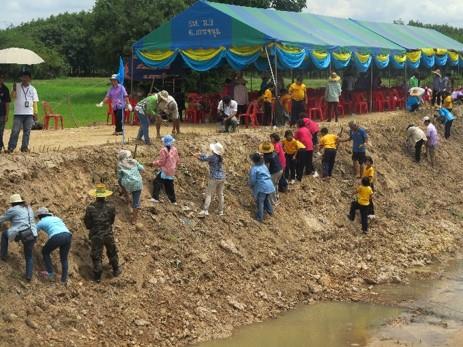(MENAFN- Asia Times) The Greater Mekong, a transnational region in Southeast Asia, spans six countries: China, Myanmar, Laos, Thailand, Cambodia and Vietnam. The region is home to more than 325 million people and, while it has survived the trauma of wars, it now faces mounting environmental threats from climate change, dams, deforestation, and declines in biodiversity, food security, and water resources.
Since Conservation International places this rich bio-diverse basin as one of the five most threatened hotspots, the ranks of professional scientists, researchers, and policy experts may not prove sufficient to reduce the dire environmental problems.
Now, through community science, or citizen science, local farmers and fishers are using their local knowledge to supplement technology as they monitor, investigate, and restore the environment.
According to the US National Advisory Council for Environmental Policy and Technology , the term ''citizen science'' means collaboratively led scientific investigation and exploration to address community-defined questions, thus allowing for public engagement in the scientific process.
This democratization of science, even against the strong headwinds of authoritarian governments, is on course to influence governmental and political decision-making on various environmental threats.

Thai villagers plant vetiver on the banks of a creek to filter and degrade phenol from contaminated shallow groundwater. Photo: Tanapon Phenrat
In Thailand and Myanmar, local contamination problems, including illegal dumping of hazardous industrial waste, abandoned coal-mine waste dumps and metal contamination from mining, jeopardize the quality of life of villagers.
As a result, several local monitoring groups from 13 provinces in the central, western, and eastern parts of Thailand have been brought together by Somnuck Jongmeewasin , an environmental management lecturer at Silpakorn University International College in Bangkok.
His community-science volunteers investigated and developed a database of 40 illegal dumps of hazardous industrial waste, previously unreported by government agencies. Several cases from this investigation led to court orders that the polluters or government agencies restore the contaminated lands.
The February military coup in Myanmar has only served to put more pressure on environmental protection efforts. Since 2015, a large and improperly disposed heap of coal-mine waste in Ban Chaung in Dawei district, Myanmar, has repeatedly spontaneously combusted, affecting a nearby indigenous community. Nevertheless, a community science approach has helped to empower the affected villagers to make risk-management decisions.
Information about suppression of existing fire and mine-waste storage options was presented to the community so they could make informed decisions about the most appropriate corrective actions that should be undertaken by the mine.
Throughout the region, and especially downstream in the Mekong Delta, incubators for the power of citizen science are visible. The average size of a Mekong rice paddy is only 1.2 hectares. In the most hardscrabble villages, even access to a smartphone is beyond the reach of many. But it only takes one citizen scientist, or an inspired professional, to assume the responsibility to empower the locals with knowledge.
Furthermore, by sharing information and joining forces, farmers are able to exert some influence over the environment on which they depend for their livelihoods.
In addition to local environmental contamination, citizen science tackles climate change. In Vietnam, from the Red River Delta to the Lower Mekong , university students are engaging in projects to monitor water quality.
''The emergence of grassroots climate initiatives assists villagers to monitor changes, to influence decision-making and to help restore their natural ecosystems,'' said Nguyen Minh Quang, co-founder of the Mekong Environment Forum (MEF) in Can Tho.
In previous MEF-directed programs, 33 students from diverse backgrounds and different universities in southern Vietnam, including Pham Thi Phuong, Nguyen Hoai Chung (journalism students from Ho Chi Minh City University of Journalism and Communication), Lam Thi So Ri and Thach My Duc (Khmer students at Can Tho University), have been trained as citizen scientists and citizen journalists.
Collectively, they work to assist with people's environmental literacy and introduce harmonious solutions to address over-exploitation of groundwater, mangrove deforestation, and climate hazards.
These young environmentalists are generating awareness that efficiency and small-scale, decentralized, and climate-smart solutions are essential for meeting economic needs without degrading natural resources.
Through community-science-led projects, volunteers and citizen journalists have raised the viability of new options to advance better resource management and grassroots sustainability by connecting ''farmer scientists'' and students, practitioners, and community representatives to open-access platforms that enable them to contribute datasets, thereby drawing public attention to environmental hotspots in their communities.
With smartphones in hand and with free science apps, citizen scientists are providing climate-smart solutions for meeting the community's economic needs without degrading natural resources.
The process of community citizen science is in line with the desirable process of public participation, which is intended to influence decisions, elevate democratic capacity, and empower marginalized individuals and communities.
Credit must be given to Rick Bonney , a retired director of Public Engagement in Science at Cornell University, who coined the idea of Public Participation in Scientific Research (PPSR).
More policymakers are beginning to recognize the benefits of a regional community-wide policy to facilitate the democratization of science to inform natural-resource management and environmental protection. These trained stewards, along with political will, may yet determine the fate of the Mekong.
MENAFN19062021000159011032ID1102306608
Legal Disclaimer:
MENAFN provides the information “as is” without warranty of any kind. We do not accept any responsibility or liability for the accuracy, content, images, videos, licenses, completeness, legality, or reliability of the information contained in this article. If you have any complaints or copyright issues related to this article, kindly contact the provider above.